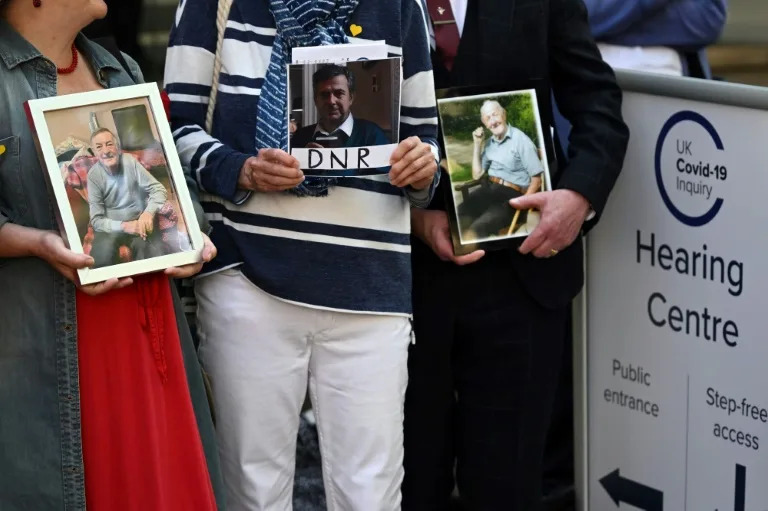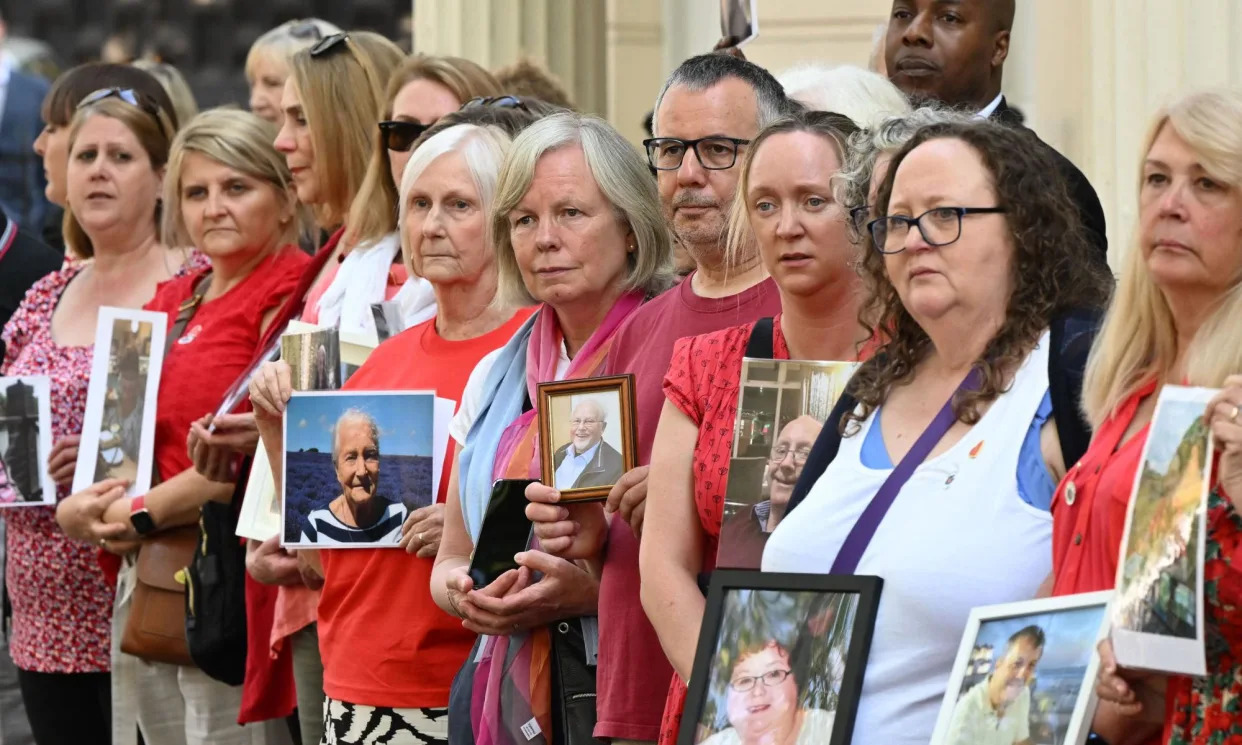UK Government 'failed' public leading to more deaths, Covid-19 inquiry finds
Alasdair Ferguson
Thu, 18 July 2024

The UK Covid-19 inquiry said there was a 'damaging absence of focus' from the Tory government (Image: Jordan Pettitt/PA Wire)
THE UK Government and the civil service “failed” the public due to “significant flaws” in preparing for the Covid-19 pandemic, a public inquiry has found.
In its first report into preparedness for a pandemic, the UK Covid-19 Inquiry said there was a “damaging absence of focus” on the measures and infrastructure that would be needed to deal with a fast-spreading disease, even though a coronavirus outbreak at pandemic scale “was forseeable”.
A major flaw, according to the inquiry, was the lack of “a system that could be scaled up to test, trace and isolate” people.
The report added: “Despite reams of documentation, planning guidance was insufficiently robust and flexible, and policy documentation was outdated, unnecessarily bureaucratic and infected by jargon.”
READ MORE: Keir Starmer told Grangemouth response is 'critical test' for Labour
The inquiry said it had “no hesitation” in concluding that the “processes, planning and policy of the civil contingencies structures within the UK government and devolved administrations and civil services failed their citizens”.
The Covid inquiry, which is being chaired by Baroness Heather Hallett (below), published its 217-page report on Thursday.
In her foreword to the report, Hallett said lessons must be learned and “never again can a disease be allowed to lead to so many deaths and so much suffering”.
The report found:
The UK “prepared for the wrong pandemic”, namely a flu pandemic. Furthermore, this flu plan was “inadequate for a global pandemic of the kind that struck”.
In the years leading up to the pandemic, “there was a lack of adequate leadership, coordination and oversight”. Ministers “failed to challenge sufficiently the advice they did receive from officials and advisers”, and they did not receive a broad enough range of scientific opinion and policy options.
Groups advising the Government “did not have sufficient freedom and autonomy to express dissenting views”, there was a lack of challenge to what was said, and the advice was often undermined by “groupthink”.
The institutions and structures responsible for emergency planning throughout government were “labyrinthine” in how complex they were.
There were “fatal strategic flaws” in the assessment of the risks facing the UK, including a future pandemic.
Emergency planning generally failed to account for how the vulnerable would be looked after, as well as those at most risk due to existing poor health, and the deprivation and societal differences already present in the UK.
There was a “failure to learn sufficiently” from past exercises designed to test the UK’s response to the spread of disease.
The “recent experiences of Sars and Mers meant that another coronavirus outbreak at pandemic scale was foreseeable. It was not a "black swan" event.
The absence of such a scenario from the risk assessments was a fundamental error of the Department of Health and Social Care and the Civil Contingencies Secretariat.
The UK government and devolved administrations could and should have "assessed the risk of a novel pathogen to reach pandemic scale".
Prior to the Covid-19 pandemic, “there was no exercising of measures such as mass testing, mass contact tracing mandated social distancing or lockdowns”.
The scenario of an emerging infectious disease reaching pandemic scale and requiring contact tracing as a first step to controlling its spread “was not considered”.
The report found that the UK’s pandemic plan for flu was written in 2011 and “was outdated and lacked adaptability”.
It added: “It was virtually abandoned on its first encounter with the pandemic.”
In her recommendations, Hallett called for a new pandemic strategy to be developed and tested at least every three years, with a UK-wide crisis response exercise.
She said the Government and political leaders should be properly held to account on a regular basis “for systems of preparedness and resilience”.
She also said external experts from outside Whitehall and government should be brought in to challenge and guard against “the known problem of groupthink”.
READ MORE: Labour MPs urge Keir Starmer to drop legal challenge against Netanyahu arrest
There were more than 235,000 deaths involving Covid-19 in the UK up to the end of 2023.
In her foreword, Hallett said: “It is not a question of ‘if’ another pandemic will strike but ‘when’.
“The evidence is overwhelmingly to the effect that another pandemic – potentially one that is even more transmissible and lethal – is likely to occur in the near to medium future.
“Unless the lessons are learned, and fundamental change is implemented, that effort and cost will have been in vain when it comes to the next pandemic.
“There must be radical reform. Never again can a disease be allowed to lead to so many deaths and so much suffering.”
Thu, 18 July 2024

The UK Covid-19 inquiry said there was a 'damaging absence of focus' from the Tory government (Image: Jordan Pettitt/PA Wire)
THE UK Government and the civil service “failed” the public due to “significant flaws” in preparing for the Covid-19 pandemic, a public inquiry has found.
In its first report into preparedness for a pandemic, the UK Covid-19 Inquiry said there was a “damaging absence of focus” on the measures and infrastructure that would be needed to deal with a fast-spreading disease, even though a coronavirus outbreak at pandemic scale “was forseeable”.
A major flaw, according to the inquiry, was the lack of “a system that could be scaled up to test, trace and isolate” people.
The report added: “Despite reams of documentation, planning guidance was insufficiently robust and flexible, and policy documentation was outdated, unnecessarily bureaucratic and infected by jargon.”
READ MORE: Keir Starmer told Grangemouth response is 'critical test' for Labour
The inquiry said it had “no hesitation” in concluding that the “processes, planning and policy of the civil contingencies structures within the UK government and devolved administrations and civil services failed their citizens”.
The Covid inquiry, which is being chaired by Baroness Heather Hallett (below), published its 217-page report on Thursday.
In her foreword to the report, Hallett said lessons must be learned and “never again can a disease be allowed to lead to so many deaths and so much suffering”.
The report found:
The UK “prepared for the wrong pandemic”, namely a flu pandemic. Furthermore, this flu plan was “inadequate for a global pandemic of the kind that struck”.
In the years leading up to the pandemic, “there was a lack of adequate leadership, coordination and oversight”. Ministers “failed to challenge sufficiently the advice they did receive from officials and advisers”, and they did not receive a broad enough range of scientific opinion and policy options.
Groups advising the Government “did not have sufficient freedom and autonomy to express dissenting views”, there was a lack of challenge to what was said, and the advice was often undermined by “groupthink”.
The institutions and structures responsible for emergency planning throughout government were “labyrinthine” in how complex they were.
There were “fatal strategic flaws” in the assessment of the risks facing the UK, including a future pandemic.
Emergency planning generally failed to account for how the vulnerable would be looked after, as well as those at most risk due to existing poor health, and the deprivation and societal differences already present in the UK.
There was a “failure to learn sufficiently” from past exercises designed to test the UK’s response to the spread of disease.
The “recent experiences of Sars and Mers meant that another coronavirus outbreak at pandemic scale was foreseeable. It was not a "black swan" event.
The absence of such a scenario from the risk assessments was a fundamental error of the Department of Health and Social Care and the Civil Contingencies Secretariat.
The UK government and devolved administrations could and should have "assessed the risk of a novel pathogen to reach pandemic scale".
Prior to the Covid-19 pandemic, “there was no exercising of measures such as mass testing, mass contact tracing mandated social distancing or lockdowns”.
The scenario of an emerging infectious disease reaching pandemic scale and requiring contact tracing as a first step to controlling its spread “was not considered”.
The report found that the UK’s pandemic plan for flu was written in 2011 and “was outdated and lacked adaptability”.
It added: “It was virtually abandoned on its first encounter with the pandemic.”
In her recommendations, Hallett called for a new pandemic strategy to be developed and tested at least every three years, with a UK-wide crisis response exercise.
She said the Government and political leaders should be properly held to account on a regular basis “for systems of preparedness and resilience”.
She also said external experts from outside Whitehall and government should be brought in to challenge and guard against “the known problem of groupthink”.
READ MORE: Labour MPs urge Keir Starmer to drop legal challenge against Netanyahu arrest
There were more than 235,000 deaths involving Covid-19 in the UK up to the end of 2023.
In her foreword, Hallett said: “It is not a question of ‘if’ another pandemic will strike but ‘when’.
“The evidence is overwhelmingly to the effect that another pandemic – potentially one that is even more transmissible and lethal – is likely to occur in the near to medium future.
“Unless the lessons are learned, and fundamental change is implemented, that effort and cost will have been in vain when it comes to the next pandemic.
“There must be radical reform. Never again can a disease be allowed to lead to so many deaths and so much suffering.”
Brexit preparations hit UK's pandemic planning: inquiry report
Helen ROWE
Thu, 18 July 2024

The Covid-19 inquiry has been examining the British government's response to the pandemic (JUSTIN TALLIS)
Preparations for a possible no-deal Brexit contributed to the UK's lack of readiness for a global pandemic, a public inquiry into the government's handling of Covid-19 concluded on Thursday.
In the first of a series of reports on the UK's response to the global health emergency, the chair of the inquiry, retired senior judge Heather Hallett, laid out a string of damning criticisms.
Her 217-page report found that UK officials had been too focused on a flu outbreak, leading it to prepare "for the wrong pandemic".
The bodies responsible for emergency planning were "labyrinthine in their complexity", advice to government was often "undermined by 'groupthink'", and advisers were not given enough freedom to "express dissenting views", it added.
Witnesses told the inquiry "that a number of workstreams for pandemic preparedness were also paused due to reallocations of resources to Operation Yellowhammer" -- the government's contingency plan to prepare for it crashing out of the European Union without an agreement.
Other factors in the UK's lack of readiness included a lack of parliamentary scrutiny and bureaucracy with a failure to "identify and accurately describe the underlying problems, compounded by the use of jargon and euphemism to disguise... tasks that had not been completed", it said.
The UK suffered one of the worst Covid-19 death tolls in Europe, with criticism levelled at the government of Conservative prime minister Boris Johnson that it failed to take the threat seriously in the early stages of the outbreak.
More than 128,500 fatalities were recorded in the UK by mid-July 2021.
Other criticism included a failure to have enough protective equipment for frontline medical staff.
Hallett called for a "major overhaul" to transform how the country prepares for civil emergencies in future.
Key recommendations included a "radical simplification" of civil emergency preparedness, a UK-wide pandemic response exercise at least every three years and the creation of a single body to oversee the whole system.
The inquiry hearings were held in London in June and July 2023.
Witnesses included politicians including Johnson and former health minister Matt Hancock, scientists, civil servants and relatives of some of those who died.
har/phz/js
Helen ROWE
Thu, 18 July 2024

The Covid-19 inquiry has been examining the British government's response to the pandemic (JUSTIN TALLIS)
Preparations for a possible no-deal Brexit contributed to the UK's lack of readiness for a global pandemic, a public inquiry into the government's handling of Covid-19 concluded on Thursday.
In the first of a series of reports on the UK's response to the global health emergency, the chair of the inquiry, retired senior judge Heather Hallett, laid out a string of damning criticisms.
Her 217-page report found that UK officials had been too focused on a flu outbreak, leading it to prepare "for the wrong pandemic".
The bodies responsible for emergency planning were "labyrinthine in their complexity", advice to government was often "undermined by 'groupthink'", and advisers were not given enough freedom to "express dissenting views", it added.
Witnesses told the inquiry "that a number of workstreams for pandemic preparedness were also paused due to reallocations of resources to Operation Yellowhammer" -- the government's contingency plan to prepare for it crashing out of the European Union without an agreement.
Other factors in the UK's lack of readiness included a lack of parliamentary scrutiny and bureaucracy with a failure to "identify and accurately describe the underlying problems, compounded by the use of jargon and euphemism to disguise... tasks that had not been completed", it said.
The UK suffered one of the worst Covid-19 death tolls in Europe, with criticism levelled at the government of Conservative prime minister Boris Johnson that it failed to take the threat seriously in the early stages of the outbreak.
More than 128,500 fatalities were recorded in the UK by mid-July 2021.
Other criticism included a failure to have enough protective equipment for frontline medical staff.
Hallett called for a "major overhaul" to transform how the country prepares for civil emergencies in future.
Key recommendations included a "radical simplification" of civil emergency preparedness, a UK-wide pandemic response exercise at least every three years and the creation of a single body to oversee the whole system.
The inquiry hearings were held in London in June and July 2023.
Witnesses included politicians including Johnson and former health minister Matt Hancock, scientists, civil servants and relatives of some of those who died.
har/phz/js
UK public 'failed' by governments which prepared for 'wrong pandemic' ahead of COVID-19, inquiry finds
Sky News
Thu, 18 July 2024

The UK's citizens were "failed" by their governments' processes, planning and policy ahead of the COVID-19 pandemic, a public inquiry has found.
There were more than 235,000 deaths involving COVID-19 in the UK up to the end of 2023 and a report published today says some of the "financial and human cost may have been avoided" had the country been better prepared for the deadly outbreak in 2020.
It is the first of nine reports to be published by the UK COVID-19 Inquiry and examines the state of the UK's structures and procedures in place to prepare and respond to a pandemic.
The 83,000-word document details "several significant flaws" including preparing for "the wrong pandemic".
Baroness Heather Hallett, the inquiry chair, is calling for "radical reform" as she makes 10 recommendations, including a major overhaul of how the UK government prepares for civil emergencies.
"Never again can a disease be allowed to lead to so many deaths and so much suffering," Lady Hallett writes in an introduction.
Speaking after the report's publication, she said: "I have no hesitation in concluding the processes, planning and policy of the civil contingency structures across the UK failed the citizens of all four nations.
"There were serious errors on the part of the state and serious flaws in our emergency systems. This cannot be allowed to happen again."
Key recommendations include a radical simplification of systems, holding a UK-wide pandemic response exercise at least every three years and the creation of a single, independent statutory body responsible for the preparedness and response of the whole system.
Read more: Why damning first report may be most important
The inquiry received 103,000 documents, 213 witness statements and heard from 68 witnesses for the first module in June and July last year, with hearings for later phases expected to continue until 2026.
The report states the UK "lacked resilience" in 2020 and was "ill prepared for dealing with a catastrophic emergency, let alone the COVID-19 pandemic that actually struck".
A slowdown in health improvement, widening health inequalities and high pre-existing levels of long-term illnesses, such as heart disease, diabetes and obesity, made the country "more vulnerable", while public services were "running close to, if not beyond capacity," it says.
The inquiry heard evidence on the potential impact of austerity measures and, while recognising the pressure on politicians to make tough decisions over the allocation of resources, the report says: "Proper preparation for a pandemic costs money."
"The massive financial, economic and human cost" is proof money spent is "vital" and "will be vastly outweighed by the cost of not doing so," it adds.
"Significant flaws" highlighted include preparing for "the wrong pandemic", with the focus on a flu pandemic "inadequate" for the global pandemic that struck, the inquiry found.
The report also says the institutions and structures responsible for emergency planning were "labyrinthine in their complexity", while the UK's sole pandemic strategy from 2011 was "outdated and lacked adaptability" and was "virtually abandoned" on its first encounter with the pandemic.
The lack of "a system that could be scaled up to test, trace and isolate" people was highlighted as a major flaw, while advice to ministers was often undermined by "groupthink".
"The inquiry has no hesitation in concluding that the processes, planning and policy of the civil contingency structures within the UK government and devolved administrations and civil services failed their citizens," the report says.
Lady Hallett said all her recommendations must be implemented to prepare for a future pandemic, which could be "even more transmissible and lethal" and "is likely to occur in the near to medium future".
"Unless the lessons are learned and fundamental change is implemented, the human and financial cost and sacrifice of the COVID-19 pandemic will have been in vain," she said.
"The harrowing accounts of loss and grief given by the bereaved witnesses and others who suffered during the pandemic serve to remind us why there must be radical reform."
Covid Inquiry's Damning Report Says Government 'Failed Its Citizens' By Planning For 'Wrong Pandemic'
Kate Nicholson
HUFFPOST
Thu, 18 July 2024

Jeremy Hunt, Matt Hancock and Baroness Hallett Getty/BBC News
The government “failed its citizens” with its insufficient and outdated planning for a pandemic, the first report from the Covid Inquiry has claimed.
The 217-page report has found that, despite planning for a flu outbreak, “our preparedness and resilience was not adequate for the global pandemic that occurred”.
The inquiry suggested the UK had been planning for the “wrong pandemic”, and said the former health secretaries – Jeremy Hunt and Matt Hancock – failed to fix flaws in contingency planning before the pandemic hit.
It also slammed the country’s “labyrinthine” emergency planning, saying the approach to risk assessment was “flawed”.
“The UK government’s outdated pandemic strategy, developed in 2011, was not flexible enough to adapt when faced with the pandemic in 2020,” the report claimed.
It added: “There was a failure to fully learn from past civil emergency exercises and outbreaks of diseases.”
Emergency planning “failed to put enough consideration into existing health and social inequalities”, according to the report.
It claimed there was a “lack of attention” to the systems that would help test, trace and isolate the disease, while policy documents were “full of jargon and overly complex”.
The report took aim at the ministers, too, saying they “often failed to challenge the advice they did get” while their advisers “lacked freedom” to express their differing opinions, often leading to “groupthink”.
Ultimately, it concluded: “If we had been better prepared, we could have avoided some of the massive financial, economic and human cost of the Covid-19 pandemic.”
It recommended a “radical simplification” of the civil emergency preparedness and resilience systems, and “streamlining the current bureaucracy”.
When announcing the report, the chair of the inquiry Baroness Hallett added that the “UK lacked resilience” in 2020.
She noted that the country had high pre-existing levels of illness and general levels of ill health at the time as well, making it more vulnerable to the outbreak of disease.
Hallett also noted that it is a question of not if but when the next pandemic will hit – and are we ready?
She said another pandemic would be “more transmissible and lethal” and likely to occur in the near to medium future.
The inquiry was launched in 2022 by then-PM Boris Johnson, and meant to examine the decision making across the country.
This report is the first of at least nine expected.
It’s not known how long the inquiry will last, as hearings are expected to continue until at least next year.
COVID report finds government 'failed' the public
UK 'prepared for the wrong pandemic', COVID inquiry finds.
Andy Wells
·Freelance Writer
Updated Thu, 18 July 2024

A person writes on The National Covid Memorial Wall, dedicated to those who lost their lives to COVID-19. (Getty Images)
The first report from the UK COVID-19 Inquiry has found the government "failed" the public, due to “significant flaws” in preparing for the pandemic.
The COVID inquiry, which is being chaired by Baroness Heather Hallett, published its 217-page report on Thursday, which found the UK "prepared for the wrong pandemic" – focusing on flu rather than a coronavirus pandemic.
In her foreword to the report, she said lessons must be learned and “never again can a disease be allowed to lead to so many deaths and so much suffering”. A major flaw, according to the inquiry, was the lack of “a system that could be scaled up to test, trace and isolate” people.
The report added: “Despite reams of documentation, planning guidance was insufficiently robust and flexible, and policy documentation was outdated, unnecessarily bureaucratic and infected by jargon.”
The inquiry said it had “no hesitation” in concluding that the “processes, planning and policy of the civil contingencies structures within the UK government and devolved administrations and civil services failed their citizens”.
Academics have said it is a question of “when not if” another pandemic will hit, so it is hoped that recommendations, if implemented, could put the UK in a better starting place to face a new and unknown disease – known by many as Disease X.
There were more than 235,000 deaths involving COVID in the UK up to the end of 2023. The overall inquiry is reportedly expected to run for around seven years.
What is the COVID report?
The first report looked into the UK’s handling of the pandemic, including how it prepared for it and how it responded once COVID began to spread.
Following the report's release on Thursday, Hallett said: “If the reforms I recommend are implemented, the nation will be more resilient and better able to avoid the terrible losses and costs to society that the COVID-19 pandemic brought.”

A briefing is set to take place at the National COVID Memorial Wall following the publication of the report. (PA)
Thu, 18 July 2024

Jeremy Hunt, Matt Hancock and Baroness Hallett Getty/BBC News
The government “failed its citizens” with its insufficient and outdated planning for a pandemic, the first report from the Covid Inquiry has claimed.
The 217-page report has found that, despite planning for a flu outbreak, “our preparedness and resilience was not adequate for the global pandemic that occurred”.
The inquiry suggested the UK had been planning for the “wrong pandemic”, and said the former health secretaries – Jeremy Hunt and Matt Hancock – failed to fix flaws in contingency planning before the pandemic hit.
It also slammed the country’s “labyrinthine” emergency planning, saying the approach to risk assessment was “flawed”.
“The UK government’s outdated pandemic strategy, developed in 2011, was not flexible enough to adapt when faced with the pandemic in 2020,” the report claimed.
It added: “There was a failure to fully learn from past civil emergency exercises and outbreaks of diseases.”
Emergency planning “failed to put enough consideration into existing health and social inequalities”, according to the report.
It claimed there was a “lack of attention” to the systems that would help test, trace and isolate the disease, while policy documents were “full of jargon and overly complex”.
The report took aim at the ministers, too, saying they “often failed to challenge the advice they did get” while their advisers “lacked freedom” to express their differing opinions, often leading to “groupthink”.
Ultimately, it concluded: “If we had been better prepared, we could have avoided some of the massive financial, economic and human cost of the Covid-19 pandemic.”
It recommended a “radical simplification” of the civil emergency preparedness and resilience systems, and “streamlining the current bureaucracy”.
When announcing the report, the chair of the inquiry Baroness Hallett added that the “UK lacked resilience” in 2020.
She noted that the country had high pre-existing levels of illness and general levels of ill health at the time as well, making it more vulnerable to the outbreak of disease.
Hallett also noted that it is a question of not if but when the next pandemic will hit – and are we ready?
She said another pandemic would be “more transmissible and lethal” and likely to occur in the near to medium future.
The inquiry was launched in 2022 by then-PM Boris Johnson, and meant to examine the decision making across the country.
This report is the first of at least nine expected.
It’s not known how long the inquiry will last, as hearings are expected to continue until at least next year.
COVID report finds government 'failed' the public
UK 'prepared for the wrong pandemic', COVID inquiry finds.
Andy Wells
·Freelance Writer
Updated Thu, 18 July 2024
A person writes on The National Covid Memorial Wall, dedicated to those who lost their lives to COVID-19. (Getty Images)
The first report from the UK COVID-19 Inquiry has found the government "failed" the public, due to “significant flaws” in preparing for the pandemic.
The COVID inquiry, which is being chaired by Baroness Heather Hallett, published its 217-page report on Thursday, which found the UK "prepared for the wrong pandemic" – focusing on flu rather than a coronavirus pandemic.
In her foreword to the report, she said lessons must be learned and “never again can a disease be allowed to lead to so many deaths and so much suffering”. A major flaw, according to the inquiry, was the lack of “a system that could be scaled up to test, trace and isolate” people.
The report added: “Despite reams of documentation, planning guidance was insufficiently robust and flexible, and policy documentation was outdated, unnecessarily bureaucratic and infected by jargon.”
The inquiry said it had “no hesitation” in concluding that the “processes, planning and policy of the civil contingencies structures within the UK government and devolved administrations and civil services failed their citizens”.
Academics have said it is a question of “when not if” another pandemic will hit, so it is hoped that recommendations, if implemented, could put the UK in a better starting place to face a new and unknown disease – known by many as Disease X.
There were more than 235,000 deaths involving COVID in the UK up to the end of 2023. The overall inquiry is reportedly expected to run for around seven years.
What is the COVID report?
The first report looked into the UK’s handling of the pandemic, including how it prepared for it and how it responded once COVID began to spread.
Following the report's release on Thursday, Hallett said: “If the reforms I recommend are implemented, the nation will be more resilient and better able to avoid the terrible losses and costs to society that the COVID-19 pandemic brought.”
A briefing is set to take place at the National COVID Memorial Wall following the publication of the report. (PA)
When did it come out?
The report was published at 12pm on Thursday, 18 July. Hallett's findings were live-streamed on the inquiry’s YouTube channel.
At 3pm, the COVID-19 Families for Justice, the BMA and TUC will hold a briefing at the National COVID Memorial Wall to react to the findings.
What is in the report?
The report has outlined its initial findings based on several modules that were looked at throughout the inquiry. These include the specific aspects of the pandemic response – resilience and preparedness, decision-making and political governance and the impact of the pandemic on healthcare.
The report found that in the years leading up to the pandemic, “there was a lack of adequate leadership, coordination and oversight”. Ministers also “failed to challenge sufficiently the advice they did receive from officials and advisers”, and they did not receive a broad enough range of scientific opinion and policy options.
It also found that groups advising the government “did not have sufficient freedom and autonomy to express dissenting views”, there was a lack of challenge to what was said, and the advice was often undermined by “groupthink”.
Additionally, the report found that the institutions and structures responsible for emergency planning throughout government were “labyrinthine” in how complex they were.
Flaws included emergency planning not accounting for how the vulnerable would be looked after, "failure to learn sufficiently" from past exercises designed to test the country's response to the spread of disease, and failures to assess pandemic risks facing the UK.
The “recent experiences of Sars and Mers meant that another coronavirus outbreak at pandemic scale was foreseeable," the report said.
"It was not a black swan event. The absence of such a scenario from the risk assessments was a fundamental error of the Department of Health and Social Care and the Civil Contingencies Secretariat. The UK government and devolved administrations could and should have assessed the risk of a novel pathogen to reach pandemic scale”.
The UK's pandemic plan for flu was written in 2011 and was described by the report as "outdated".
In her recommendations, Hallett called for a new pandemic strategy to be developed and tested at least every three years, with a UK-wide crisis response exercise.
She said the government and political leaders should be properly held to account on a regular basis “for systems of preparedness and resilience”.
Inquiry chair Baroness Heather Hallett will report on how well the UK was able to face a deadly outbreak in the run up to 2020. (UK COVID-19 Inquiry/Getty)
Who was named?
Jeremy Hunt and Matt Hancock, both former health secretaries, were named by Hallett as failing to address contingency planning flaws ahead of the pandemic.
The UK was “dangerously mistaken” to believe that it was one of the best prepared countries in the world to respond to a pandemic, Hallett said.
Former health secretary Matt Hancock gave evidence to the COVID inquiry. (Getty)
In 2019, it was widely believed in Britain and abroad that the UK was “not only properly prepared but was one of the best-prepared countries in the world to respond to a pandemic,” she said.
“This belief was dangerously mistaken. In reality, the UK was ill-prepared for dealing with the whole-system civil emergency of a pandemic, let alone the coronavirus pandemic that actually struck.
Hunt told the inquiry that he was part of “groupthink” when he was health secretary, leading to a “narrowness of thinking” that failed to expand UK pandemic preparedness beyond planning for a flu outbreak.
Hancock and Hunt failed to prepare UK for pandemic, Covid inquiry finds
Robert Booth Social affairs correspondent
Thu, 18 July 2024

Campaigners from the Covid-19 Bereaved Families for Justice group outside the inquiry last summer.Photograph: Justin Tallis/AFP/Getty Images
The former health secretaries Jeremy Hunt and Matt Hancock have been criticised for their failure to better prepare the UK for the pandemic in a damning first report from the Covid inquiry that calls for a major overhaul in how the government prepares for civil emergencies.
Hunt, who was the health secretary from 2012-18, and Hancock, who took over until 2021, were named by the chair to the inquiry, Heather Hallett, for failing to rectify flaws in contingency planning ahead of the pandemic, which claimed more than 230,000 lives in the UK.
The government had focused largely on the threat of an influenza outbreak despite the fact that coronaviruses in Asia and the Middle East in the preceding years meant “another coronavirus outbreak at a pandemic scale was foreseeable” and to overlook that was “a fundamental error”.
“It was not a black swan event,” Lady Hallett said in a 240-page report that concluded: “The processes, planning and policy of the civil contingency structures within the UK government and devolved administrations and civil services failed their citizens.
“Never again can a disease be allowed to lead to so many deaths and so much suffering.”
Among the former senior court of appeal judge’s recommendations were:
The leader or deputy leader of each of the four nations should chair a cabinet-level committee responsible for civil emergency preparedness.
A UK-wide pandemic response exercise should be run at least every three years and a new UK-wide, whole-system civil emergency strategy be put in place.
External “red teams” should regularly challenge the principles, evidence and advice on emergency plans.
An independent statutory body should be established to advise the UK government and devolved administrations, and consult with voluntary groups and council-based directors of public health on civil emergency preparedness and response.
The findings about the UK’s structures and procedures in place to prepare for and respond to a pandemic are the first from the statutory inquiry into Covid-19 and are based on six weeks of hearings last summer as well as the disclosure of thousands of documents.
The report was published at the inquiry hearing rooms in west London where families who lost loved ones gathered to mark what they described as “a huge milestone”.
Related: Hubris and preparing for wrong type of pandemic: five key takeaways from Covid inquiry verdict
Thousands of bereaved families had campaigned for a public inquiry before it was announced by Boris Johnson in May 2021. At least nine more reports are due to be published on a rolling basis in the next two to three years as government, health systems, schools, councils, scientists and economists continue to grapple with the consequences of the deadly pandemic.
Hallett also said preparations for a no-deal Brexit caused work on pandemic preparedness to be paused.
In the years preceding the Covid-19 outbreak, “there had been a slowdown in health improvement, and health inequalities had widened. Public services were running close to, if not beyond capacity.
“If the reforms I recommend are implemented, the nation will be more resilient and better able to avoid the terrible losses and costs to society that the Covid-19 pandemic brought,” she said. “I expect all my recommendations to be acted on … I, and my team, will be monitoring this closely.”
There was implicit criticism of George Osborne, the chancellor from 2010-16, for the Treasury failing to plan for non-economic shocks. Hallett said it could have “identified, in advance … major economic policy options that could be deployed in the event of a pandemic”.
Osborne had told the inquiry “there was no planning done by the UK Treasury or indeed as far as I am aware, any western treasury, for asking the entire population to stay at home for months and months on end”.
Hallett said that had the UK been better prepared some of the human and financial cost may have been avoided.
“Prior to the Covid-19 pandemic, there was no ministerial leadership within the UK government and devolved administrations that could consider strategy, direct policy and make decisions across the whole of government to prepare for and build resilience to whole-system civil emergencies,” she said.
Key flaws in preparedness included:
The UK being prepared for the wrong pandemic: influenza. When Hancock became health secretary in July 2018 his day one briefing said: “Pandemic flu is the government’s highest risk”.
The institutions responsible for emergency planning being “labyrinthine in their complexity”.
The government’s sole pandemic strategy (for flu) being outdated – it was from 2011 – and lacking adaptability.
A failure to appreciate the impact of the pandemic and the response to it on ethnic minority communities, and people in poor health and with other vulnerabilities.
A failure to learn from earlier civil emergency exercises and disease outbreaks.
A “damaging absence of focus” on systems such as test, trace and isolate that could be scaled up.
A lack of adequate leadership in the preceding years, with ministers, untrained in civil contingencies, not being presented with a broad range of scientific opinion. They also failed to sufficiently challenge the advice they got, which in any event was beset by “groupthink”.
On lockdowns, Hallett highlighted Hancock’s evidence that the standing 2011 flu strategy was not for preventing a pandemic having a disastrous effect, but “a strategy of dealing with the disastrous effect of a pandemic”. The strategy gave no consideration to legally mandated lockdowns as a response and Hallett said they must in future “be considered properly in advance of a novel infectious disease outbreak” alongside ways to “prevent a lockdown”.
She said all health secretaries who adhered to the 2011 strategy, which included Hunt, bore responsibility “for failing to have these flaws examined and rectified”.
“This includes Mr Hancock, who abandoned the strategy when the pandemic struck, by which time it was too late to have any effect on preparedness and resilience.”
Hancock had told the inquiry he was “assured that the UK was one of the best placed countries in the world for responding to a pandemic” and that he viewed the World Health Organization, which ranked the UK as a world leader, as “an authoritative source”.
Hallett said “there were a great number of ministers who could have done more by asking questions about it. Mr Hunt accepted that ‘collectively we didn’t put anything like the time and effort and energy’ into understanding the dangers of pathogens and challenging the consensus. This inquiry agrees.”
Former government ministers who were cross-examined in this first module of the inquiry on the UK’s resilience and preparedness included the prime minister, chancellor and health secretary in the years before the pandemic – David Cameron, Osborne and Hunt respectively – and the health secretary, chancellor of the Duchy of Lancaster and Cabinet Office minister who were in charge immediately before and during Covid – Hancock, Michael Gove and Oliver Dowden.
Even before the findings were released the Covid-19 Bereaved Families for Justice group was calling for urgent reforms from the new Labour government, including the appointment of a secretary of state for resilience and civil emergencies; a standing scientific committee on pandemics, crisis training for ministers and officials, and the establishment of a “red team” to challenge pandemic preparations.
A spokesperson for the group said: “Plans for a pandemic were fatally inadequate; they were outdated, poorly communicated across the government, disregarded the impact of inequalities and were primarily concerned with pandemic flu. Such pandemic planning as there was did not address inequalities, and nothing was done to mitigate vulnerabilities caused by structural discrimination, institutional racism or health inequalities. Our loved ones, colleagues and communities paid the price for that failure.”
The Covid inquiry is to produce a report on political decision-making, and evidence will be taken this autumn on the impact of the pandemic on the health systems of England, Scotland, Northern Ireland and Wales. Next year witnesses will be asked about vaccines and therapeutics. Investigations are under way on: procurement, the test, trace and isolate system, and the care sector. Future investigations into children and young people, and the economic response have been announced.
No comments:
Post a Comment